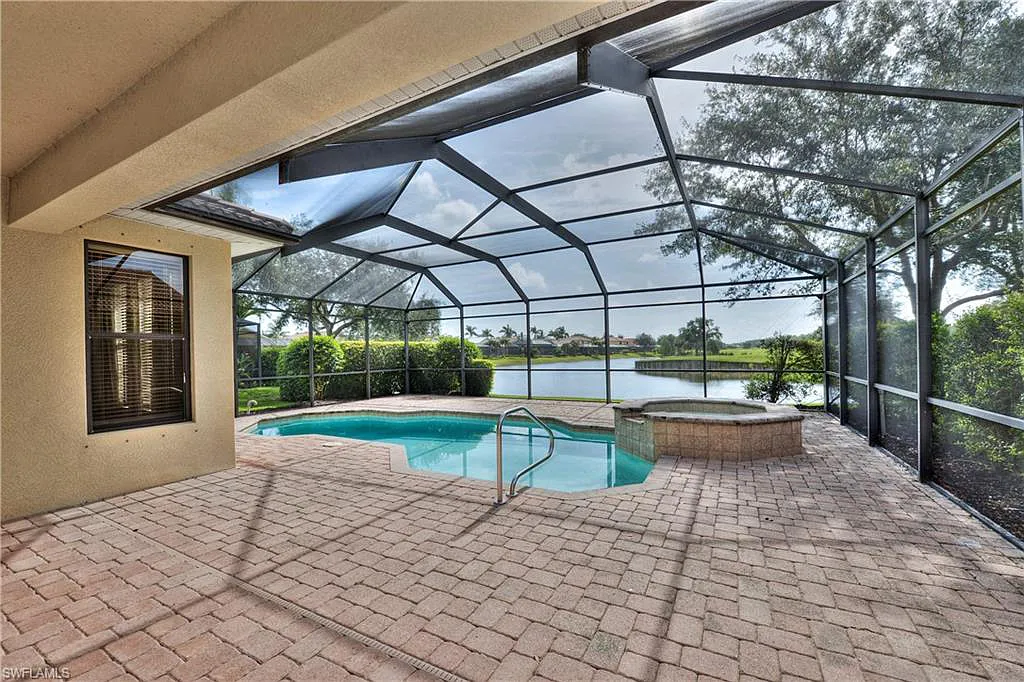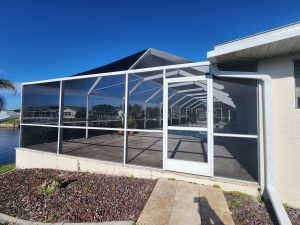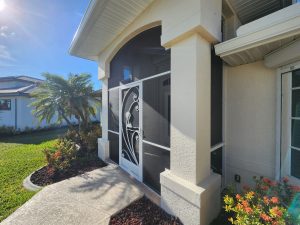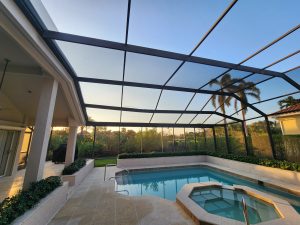Rescreening a pool cage is an essential maintenance task for homeowners in Naples, Florida, where the tropical climate takes its toll on outdoor structures. The cost of rescreening varies depending on several factors, including the size of the pool cage, the type of screen used, and whether it’s a partial or full rescreening. In this blog, we’ll explore the different elements that influence the cost of rescreening and provide an overview of what Naples homeowners can expect to pay for this important service.
1. Factors That Affect the Cost of Rescreening a Pool Cage
Several factors play a role in determining the final cost of rescreening your pool cage. Here are the most significant considerations:
Size of the Pool Cage
One of the most obvious factors that influence the price is the size of your pool cage. Larger pool enclosures require more material and labor, increasing the overall cost. Pool cages in Naples come in various sizes, ranging from smaller enclosures to full-sized pool areas that require a large amount of screening material.
Type of Screen Material
There are several types of screen materials available, each with different levels of durability and cost. The most common options include:
- Standard Fiberglass Mesh: This is the most affordable option and typically costs less upfront. However, it may need to be replaced sooner than more durable options due to wear and tear from the Florida climate.
- Pet-Resistant Screens: Made from stronger materials, these screens are more resistant to clawing and scratching, making them ideal for homes with pets. They are generally more expensive than standard fiberglass mesh.
- No-See-Um Screens: If you’re dealing with tiny, pesky insects like no-see-ums, these screens are specially designed with a tighter weave to keep them out. While they offer better protection, they are more expensive than regular screens.
- Solar Screens: These screens not only provide protection from bugs but also offer shade and UV protection. This can help reduce energy costs, but they come at a higher price.
Partial vs. Full Rescreening
The extent of the rescreening job will also impact the cost. A partial rescreening may be necessary if only a few panels are damaged, which would cost significantly less than a full rescreening. A full rescreening involves replacing all the panels, which is more expensive but may be the best option for older enclosures where most of the screen has deteriorated.
Labor Costs
Labor is another significant factor in the overall cost. The complexity of your pool cage’s design—such as whether it has high walls or intricate details—will impact the amount of time and effort required, which in turn affects labor costs. Experienced companies will typically provide a free estimate, so you can understand the breakdown of costs before proceeding.
Additional Repairs
In some cases, the frame of the pool cage may also need repairs or painting. If your pool enclosure’s frame has been damaged due to storms or aging, you may need to include the cost of frame repairs in the rescreening process. This can add to the overall price, but it’s an important investment to ensure the longevity and stability of your pool cage.
2. Typical Cost Ranges for Rescreening a Pool Cage in Naples, FL
While the exact cost of rescreening varies based on the factors mentioned above, here are some general price ranges for homeowners in Naples, Florida:
- Partial Rescreening: For a few damaged panels, homeowners can expect to pay anywhere from $150 to $600, depending on the extent of the damage and the type of screen being replaced.
- Full Rescreening: A full rescreening for an average-sized pool cage typically costs between $1,200 and $3,500. This price can increase for larger pool enclosures or if premium screen materials like pet-resistant or solar screens are used.
- Premium Screen Options: If you’re opting for more specialized materials such as no-see-um screens or solar screens, the cost can increase by 20-40% compared to standard fiberglass mesh.
- Frame Repairs: If your pool cage requires structural repairs to the frame, this can add an additional $500 to $2,500, depending on the extent of the damage and the amount of labor involved.
3. Why Rescreening is a Worthwhile Investment
For homeowners in Naples, FL, rescreening your pool cage is an essential investment. The Florida climate can be harsh on outdoor structures, with high humidity, strong sun, and the occasional hurricane causing wear and tear over time. Keeping your pool cage in good condition through regular rescreening ensures that you can continue to enjoy a clean, safe, and comfortable outdoor space.
Benefits of Rescreening Your Pool Cage:
- Increased Durability: Regular rescreening helps prolong the life of your pool cage and prevents more expensive repairs or replacements down the line.
- Improved Comfort: A well-maintained screen enclosure keeps insects, debris, and direct sunlight out, allowing you to enjoy your pool area more comfortably.
- Enhanced Property Value: A properly maintained pool cage adds to the overall value of your home. In Florida, where outdoor living spaces are a major selling point, a well-screened pool cage can make your property more attractive to potential buyers.
4. Choosing the Right Rescreening Company
When it comes to rescreening your pool cage, choosing the right company is crucial to ensuring a high-quality result. At Best Rescreen Company, we have over 30 years of experience rescreening pool cages in Naples, FL, and the surrounding areas. We provide top-quality materials and workmanship, ensuring your pool enclosure will be both durable and aesthetically pleasing.
Our team offers free estimates, so you can get a clear understanding of the cost and scope of your rescreening project before we get started. Whether you’re in need of a small repair or a full rescreening, we have the expertise to get the job done right.
The cost of rescreening a pool cage in Naples, FL, varies based on several factors, including the size of the enclosure, the type of screen material, and whether you’re opting for partial or full rescreening. On average, homeowners can expect to spend between $1,200 and $3,500 for a full rescreening, with additional costs for premium materials or frame repairs.
By investing in a rescreening project, you can protect your pool from insects, debris, and UV rays while enhancing the value and safety of your outdoor space. If you’re ready to rescreen your pool cage, contact Best Rescreen Company for a free consultation today! We’re here to help you maintain your pool enclosure and keep it looking great for years to come.




